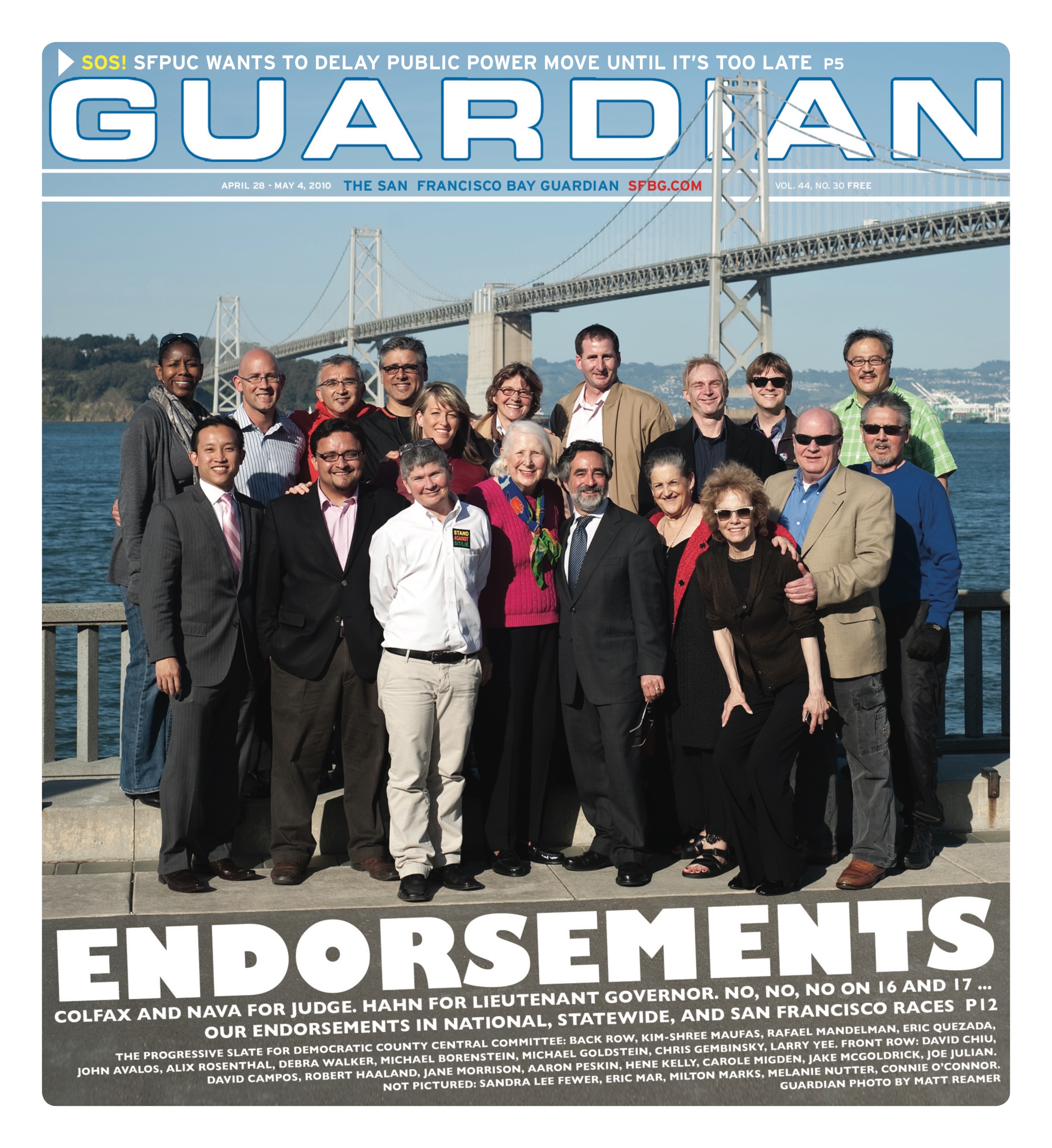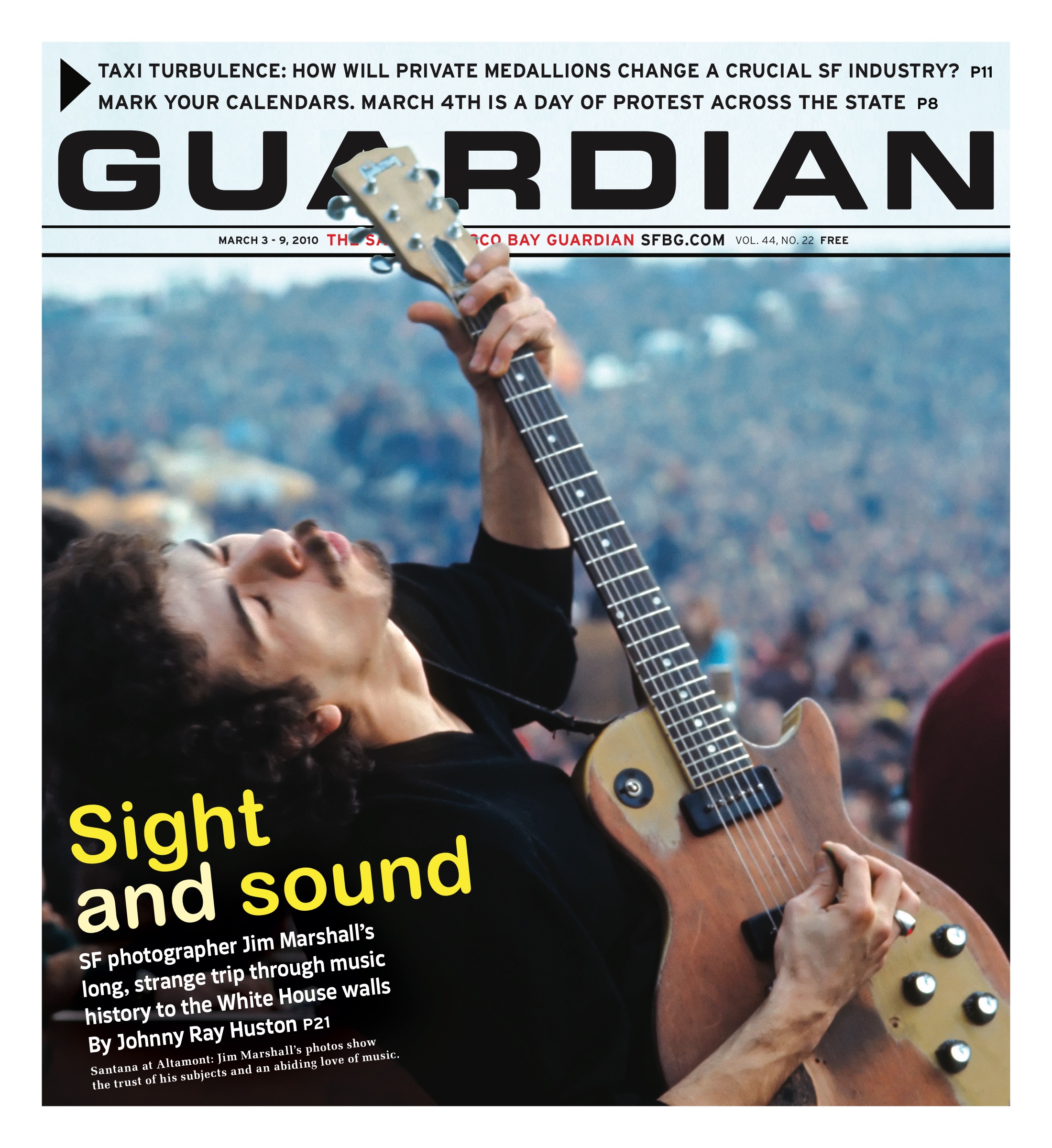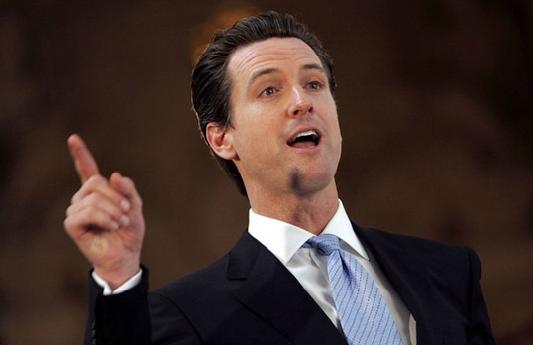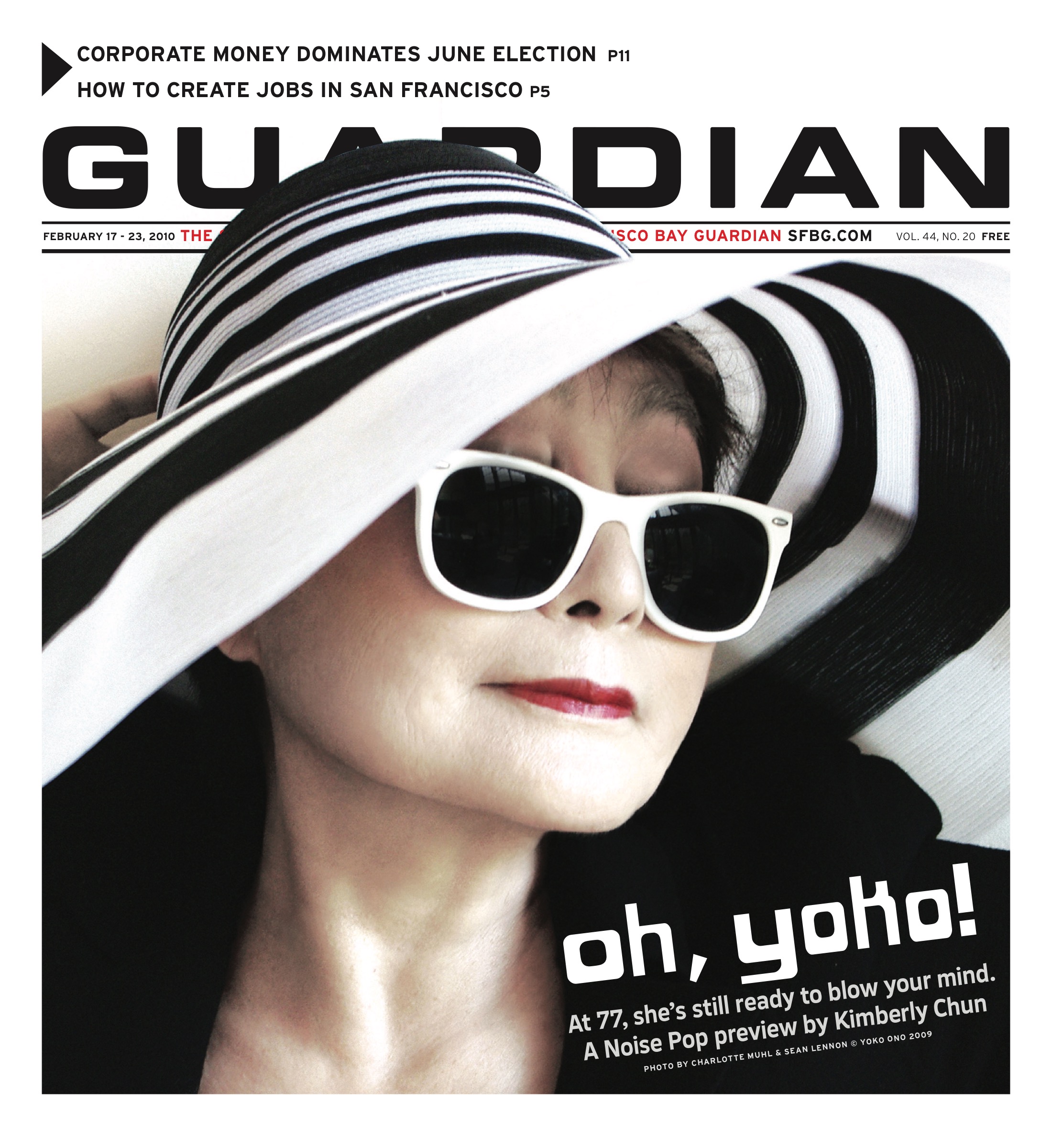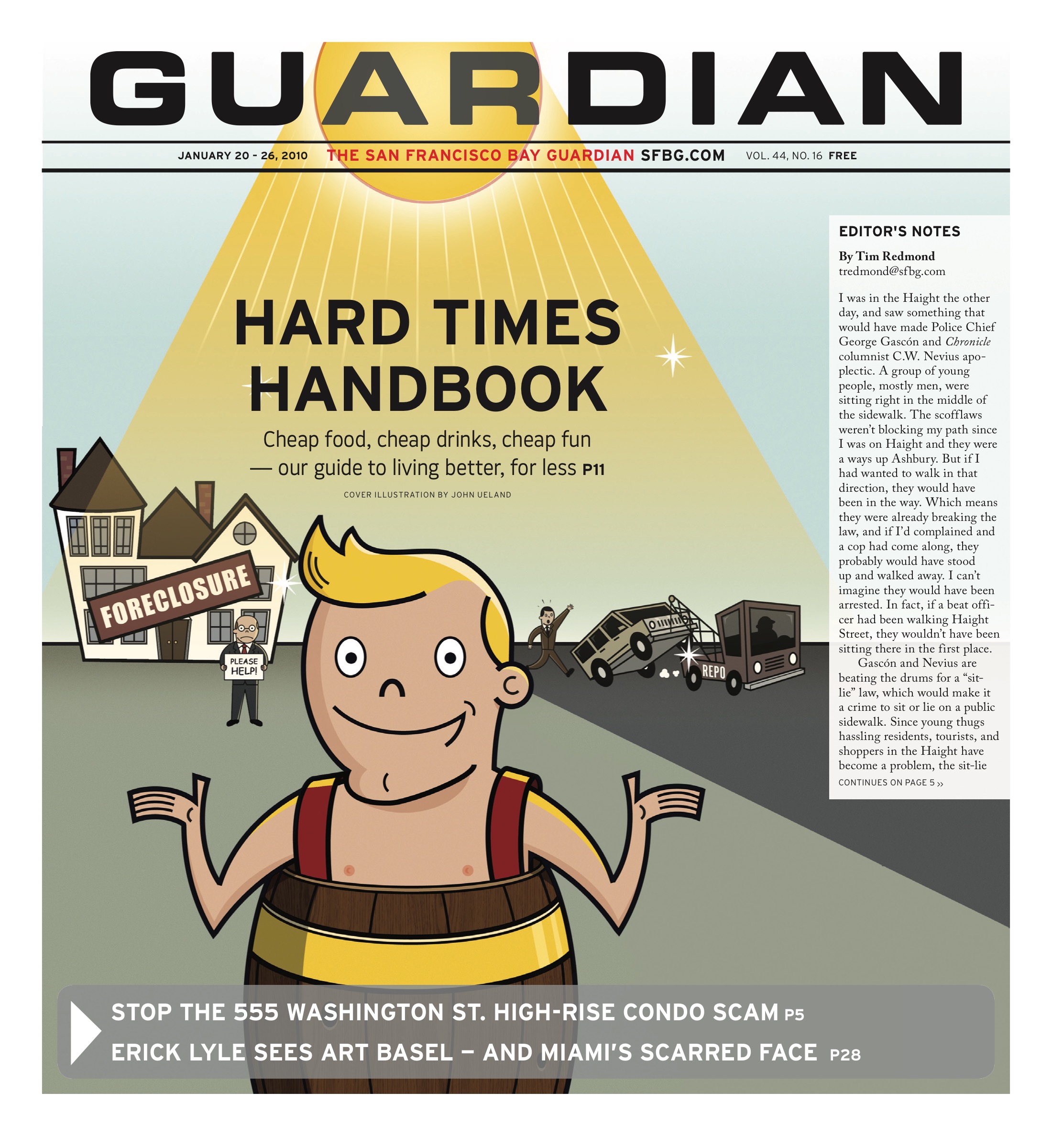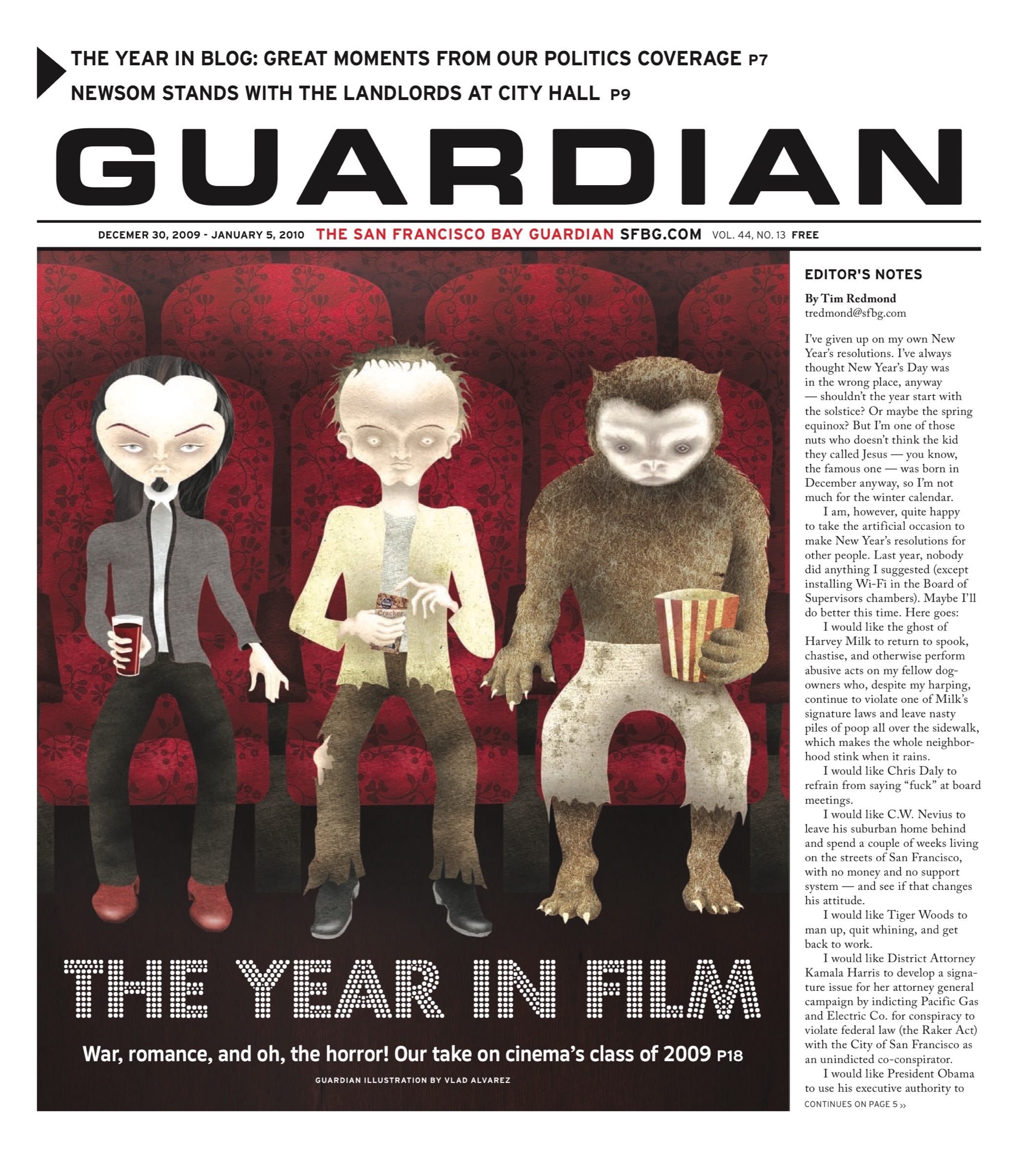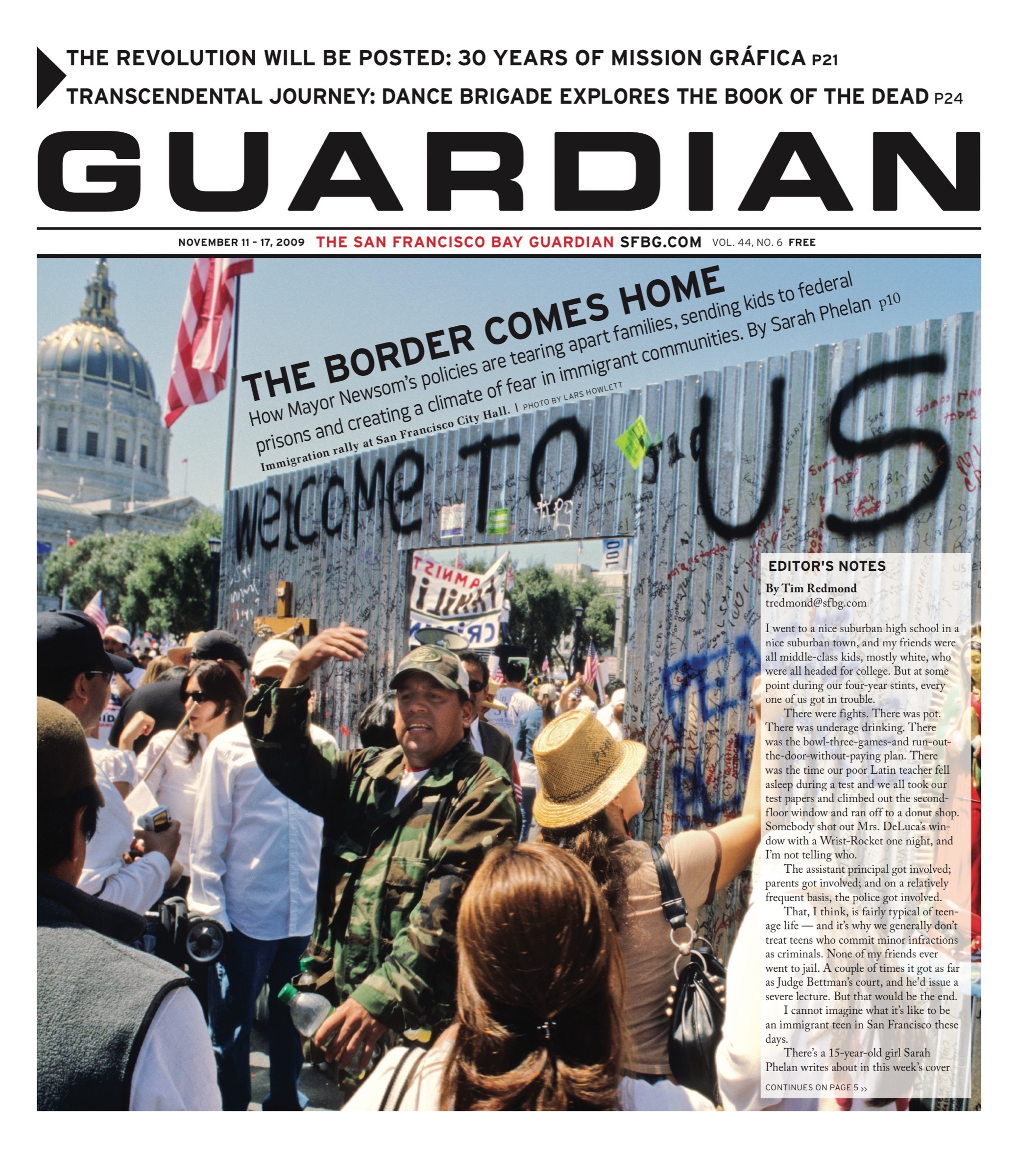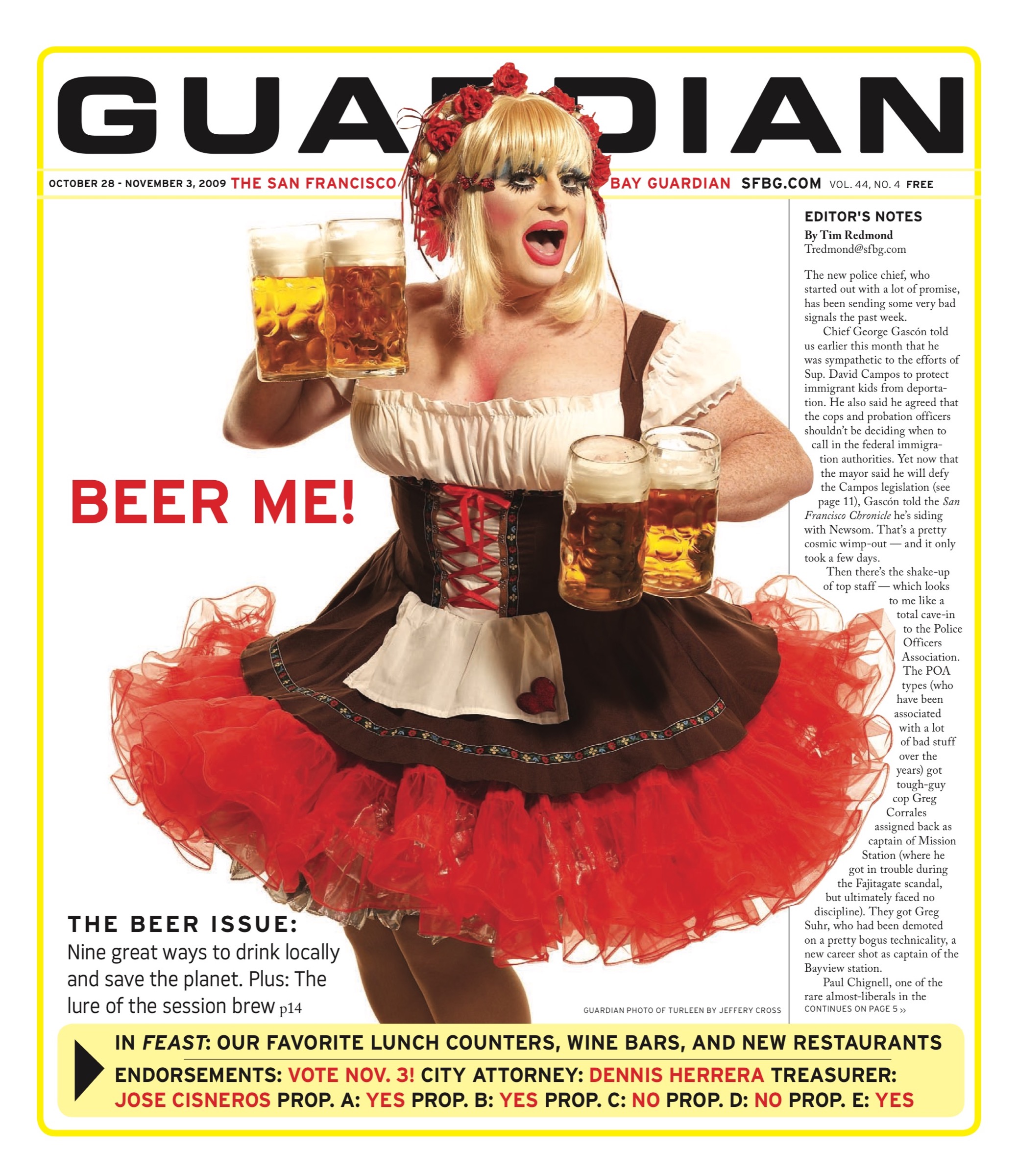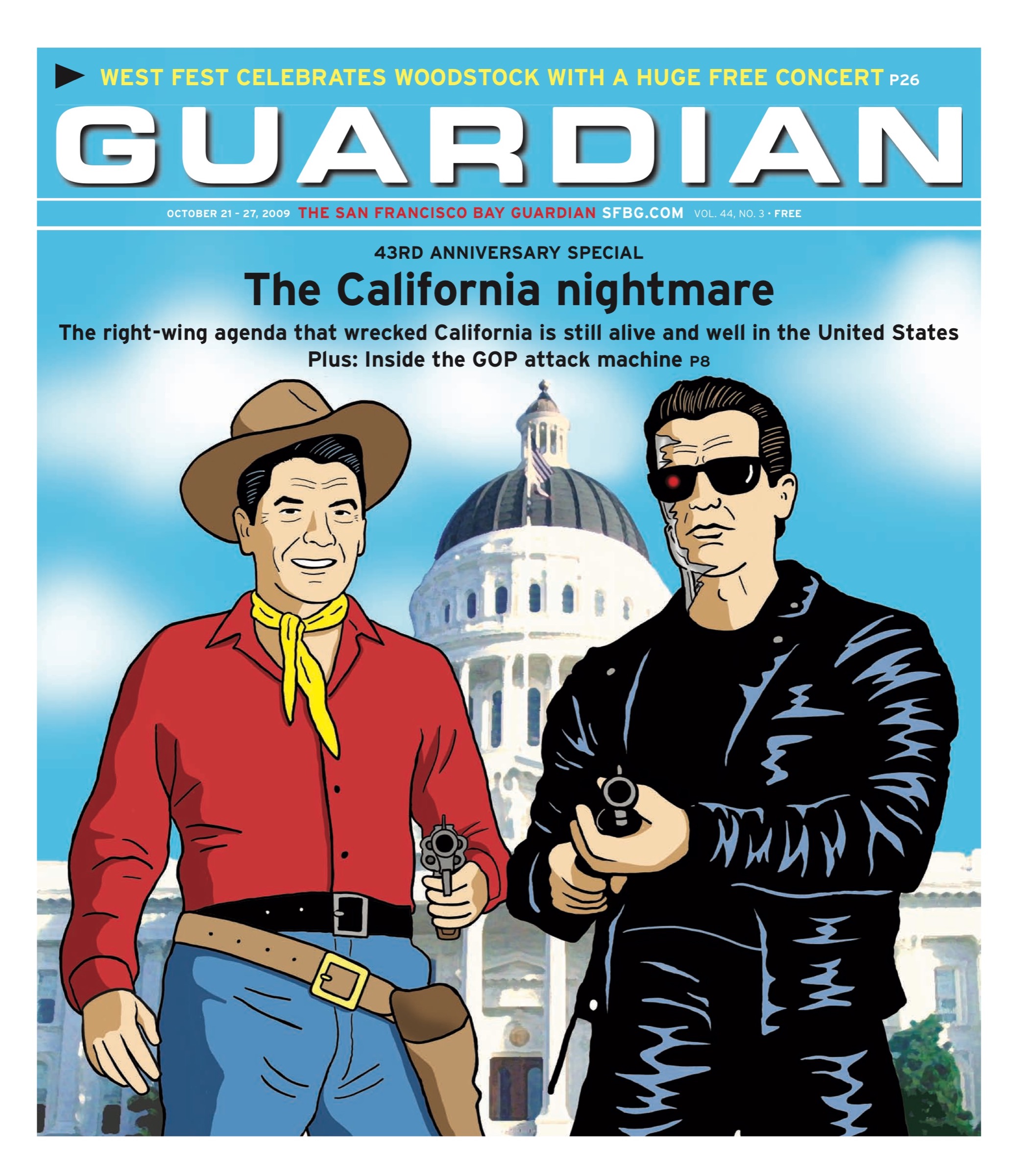Music listings are compiled by Paula Connelly and Cheryl Eddy. Since club life is unpredictable, it’s a good idea to call ahead to confirm bookings and hours. Prices are listed when provided to us. Submit items at listings@sfbg.com.
WEDNESDAY 24
ROCK/BLUES/HIP-HOP
Acid Mothers Temple, OGOD Bottom of the Hill. 9:30pm, $12.
Asteroids Galaxy Tour Independent. 8pm, $15.
Bridez Knockout. 10pm, $5.
Keith Crossan Biscuits and Blues. 8pm, $15.
High Places, Mi Ami, Protect Me Rickshaw Stop. 8pm, $12.
Nadas, Blue Bonfire Hotel Utah. 9pm, $8.
No Captains, Black Sails Western Shores, Why I Hate, Singularity Thee Parkside. 8pm, $5.
*Pentagram, Ludicra, Slough Feg, Orchid DNA Lounge. 8:30pm, $22.
Power Solo, Chris Jones, Chief Nowhere, Federale, DJ Neil Martinson Hemlock Tavern. 9pm, $7.
*Rainbow Arabia, Sutekh, K. Flay, Shlohmo, Oy Café du Nord. 8pm, $12.
FOLK/WORLD/COUNTRY
Somerville and Keehan Plough and Stars. 9pm.
Gaucho, Michael Abraham Jazz Session Amnesia. 8pm, free.
DANCE CLUBS
Booty Call Q-Bar, 456 Castro, SF; www.bootycallwednesdays.com. 9pm. Juanita Moore hosts this dance party, featuring DJ Robot Hustle.
Hands Down! Bar on Church. 9pm, free. With DJs Claksaarb, Mykill, and guests spinning indie, electro, house, and bangers.
Jam Wednesday Infusion Lounge. 10pm, free. DJ Slick Dee.
Machine Sloane, 1525 Mission, SF; (415) 621-7007. 10pm, free. Warm beats for happy feet with DJs Sergio, Conor, and André Lucero.
Mary-Go-Round Lookout, 3600 16th St, SF; (415) 431-0306. 10pm, $5. A weekly drag show with hosts Cookie Dough, Pollo Del Mar, and Suppositori Spelling.
RedWine Social Dalva. 9pm-2am, free. DJ TophOne and guests spin outernational funk and get drunk.
Respect Wednesdays End Up. 10pm, $5. Rotating DJs Daddy Rolo, Young Fyah, Irie Dole, I-Vier, Sake One, Serg, and more spinning reggae, dancehall, roots, lovers rock, and mash ups.
Shutter Elbo Room. 10pm, $5. Goth with DJs Nako, Omar, and Justin.
Synchronize Il Pirata, 2007 16th St, SF; (415) 626-2626. 10pm, free. Psychedelic dance music with DJs Helios, Gatto Matto, Psy Lotus, Intergalactoid, and guests.
Yoruba Dance Sessions Bacano! Som., 2925 16th St, SF; (415) 558-8521. 9pm, free. With resident DJ Carlos Mena and guests spinning afro-deep-global-soulful-broken-techhouse.
THURSDAY 25
ROCK/BLUES/HIP-HOP
Al Qaeda, Nondor Devai and Ben Wolcott, Bank of Christ Hemlock Tavern. 9pm, $6.
Cymbals Eat Guitars, Bear In Heaven, Freelance Whales Bottom of the Hill. 9pm, $10.
Deeper, Socialized, Scar Pink Hotel Utah. 9pm, $8.
Enne Enne, Rad Cloud, Sexx Act Café du Nord. 9pm, $10.
Flakes, Hot Lunch, Silver Skies Thee Parkside. 9pm, $6.
Garotas Suecas, Lumerians, Greg Ashley Rickshaw Stop. 8pm, $10.
Phil Gates Biscuits and Blues. 8pm, $15.
Swann Danger, Monozid, Bootblacks, DJ Nako Knockout. 9:30pm, $6.
"Thursday Night Live" Cellspace, 2050 Bryant, SF; thursdaynightnow@gmail.com. 9pm, free. With Holly Saucy, EyeZon, Serendipity Project, and Isis Genesis.
JAZZ/NEW MUSIC
"Full Moon Concert Series: Storm Moon" Luggage Store Gallery, 1007 Market, SF; www.luggagestoregallery.org. 8pm, $6-10. With Joshua Churchill and Paul Clipson, and Peter Kolovos.
Hauschka and Dustin O’Halloran with MagiK*MagiK String Quintet Swedish American Hall (upstairs from Café du Nord). 7:30pm, $16.
"Music at Large: The Rites of Spring" Velma’s, 2246 Jerrold, SF; (415) 824-4606. 7pm. With Lewis Jordan and more.
Najee Yoshi’s San Francisco. 8 and 10pm, $20-26.
FOLK/WORLD/COUNTRY
Bautista Cigar Bar and Grill, 850 Montgomery, SF; www.cigarbarandgrill.com. 9pm, $7.
Bluegrass and Old Time Jam Atlas Café. 8pm, free.
Christopher Dallman Dolores Park Café. 7:30pm, free.
Eric Maskol Café Royale, 800 Post, SF; (415) 641-6033. 8pm, free.
Montana Slim, Greensky Bluegrass, Nat Keefe Independent. 8pm, $15.
Tipsy House Plough and Stars. 9pm.
DANCE CLUBS
Afrolicious Elbo Room. 9:30pm, $5-7. DJs Pleasuremaker and Señor Oz spin Afrobeat, Tropicália, electro, samba, and funk.
Apoptygma Berzerk, Anix, Dismantled DNA Lounge. 9pm, $16.
Caribbean Connection Little Baobab, 3388 19th St, SF; (415) 643-3558. 10pm, $3. DJ Stevie B and guests spin reggae, soca, zouk, reggaetón, and more.
Dirty Dishes LookOut, 3600 16th St., SF; (415) 431-0306. 9pm, $2. With DJs B-Haul and Gordon Gartrell spinning electric-hop, bassy-house, indielectronica, and more.
Drop the Pressure Underground SF. 6-10pm, free. Electro, house, and datafunk highlight this weekly happy hour.
Funky Rewind Skylark. 9pm, free. DJ Kung Fu Chris, MAKossa, and rotating guest DJs spin heavy funk breaks, early hip-hop, boogie, and classic Jamaican riddims.
Good Foot Yoruba Dance Sessions Bacano! Som., 2925 16th St, SF; (415) 558-8521. 9pm, free. A James Brown tribute with resident DJs Haylow, A-Ron, and Prince Aries spinning R&B, Hip hop, funk, and soul.
Gymnasium Matador, 10 Sixth St, SF; (415) 863-4629. 9pm, free. With DJ Violent Vickie and guests spinning electro, hip hop, and disco.
Heat Icon Ultra Lounge. 10pm, free. Hip-hop, R&B, reggae, and soul.
Kick It Bar on Church. 9pm. Hip-hop with DJ Jorge Terez.
Koko Puffs Koko Cocktails, 1060 Geary, SF; (415) 885-4788. 10pm, free. Dubby roots reggae and Jamaican funk from rotating DJs.
Mestiza Bollywood Café, 3376 19th St, SF; (415) 970-0362. 10pm, free. Showcasing progressive Latin and global beats with DJ Juan Data.
Peaches Skylark, 10pm, free. With an all female DJ line up featuring Deeandroid, Lady Fingaz, That Girl, and Umami spinning hip hop.
Popscene 330 Rich. 10pm, $10. Rotating DJs spinning indie, Britpop, electro, new wave, and post-punk.
Represent Icon Lounge. 10pm, $5. With Resident DJ Ren the Vinyl Archaeologist and guest.
Swedish Invasion Club Six. 9pm, $10. With live performances by Looptroop Rockers, Timbuktu and Chords, Adam Tensta, and more and DJ Platurn spinning hip hop.
FRIDAY 26
ROCK/BLUES/HIP-HOP
Chatmonchy Amoeba Music, 1855 Haight, SF; (415) 831-1200. 6pm, free.
Chatmonchy, Red Bacteria Vacuum, Omodaka, Okamotos, JinnyOops! Independent. 8pm, $15.
Coathangers, Spencey Dude and the Doodles, Aerosols Hemlock Tavern. 9:30pm, $7.
Fall of Troy, Envy on the Coast, Twin Atlantic Slim’s. 7:30pm, $16.
Field Music, Old-Fashioned Way, Sands Café du Nord. 9:30pm, $12.
*Hammerfall, Powerglove, Ruffians Regency Ballroom. 9pm, $28-60.
Jeremy Goodfeather Band, Sioux City Kid, Stow Aways, Jeff St. John Hotel Utah. 9pm, $10.
Kite Operations, XYZR_KX, Gold Medalists, Jack Tung Retox Lounge. 10pm, $5.
Life in 24 Frames, Loaded for Bear, Myonics El Rio. 9pm, $5.
Low Anthem, Timbre Timber, Barr Brothers Great American Music Hall. 9pm, $15.
Money Mark, Tommy Guerrero, and Marc and the Casuals Gallery 16, 501 3rd St., SF; (415) 626-7495. 7pm, $20. Part of Soulfood No. 2.
Steve Lucky and the Rhumba Bums Biscuits and Blues. 8 and 10pm, $20.
*Midnight Bombers, Get Dead, My Life in Black and White, Rockfight Thee Parkside. 9:30pm, $7.
Think About Life, Heavenly States, Kill Moi Bottom of the Hill. 10pm, $10.
JAZZ/NEW MUSIC
Audium 9 1616 Bush, SF; (415) 771-1616. 8:30pm, $15.
Black Market Jazz Orchestra Top of the Mark. 9pm, $10.
Eric Kurtzrock Trio Ana Mandara, Ghirardelli Square, 891 Beach, SF; (415) 771-6800. 8pm, free.
Najee Yoshi’s San Francisco. 8 and 10pm, $22-32.
Trombone Trio Rite Spot, 2099 Folsom, SF; www.ritespotcafe.net. 9pm, free.
FOLK/WORLD/COUNTRY
Blind Willies Revolution Café, 3248 22nd St., SF; (415) 642-0474. 8:30pm, free.
Culture Canute Grant and Green Saloon. 9:30pm. With the Rockstone Players and the Realization Crew.
Jeffery Halford and the Healers, Tom Heyman Plough and Stars. 9pm.
Jeremy Goodfeather Hotel Utah. 9pm, $8.
Toshio Hirano Mercury Café, 201 Octavia, SF; (415) 252-7855. 7:30pm, free.
Kathryn Jenson Revolution Café, 3248 22nd St, SF; (415) 642-0474. 8:45pm, free.
Lagos Roots Connecticut Yankee, 100 Connecticut, SF; (415) 552-4440. 10pm, $10. With members of Fela Kuti and the Afrika 70, and more.
Paper Raincoat Noe Valley Ministry, 1021 Sanchez, SF; (415) 454-5238. 8:15pm, $17. With Vienna Teng.
Rob Reich and Craig Ventresco Amnesia. 7pm, free.
Rumbache Cigar Bar and Grill, 850 Montgomery, SF; www.cigarbarandgrill.com. 9pm, $7.
"Sila Presents Sahara" Coda. 9pm, $10.
DANCE CLUBS
Activate! Lookout, 3600 16th St, SF; (415) 431-0306. 9pm, $3. Face your demigods and demons at this Red Bull-fueled party.
Bar on Church 9pm. Rotating DJs Zax, Zhaldee, and Nuxx.
Blow Up Rickshaw Stop. 10pm, $10. With rotating DJs.
Exhale, Fridays Project One Gallery, 251 Rhode Island, SF; (415) 465-2129. 5pm, $5. Happy hour with art, fine food, and music with Vin Sol, King Most, DJ Centipede, and Shane King.
Fat Stack Fridays Koko Cocktails, 1060 Geary, SF; (415) 885-4788. 10pm, free. With rotating DJs Romanowski, B-Love, Tomas, Toph One, and Vinnie Esparza.
4OneFunktion Elbo Room. 10pm, $5-10. Hip-hop and turntablism with Apollo and Shortkut.
Gay Asian Paradise Club Eight, 1151 Folsom, SF; www.eightsf.com. 9pm, $8. Featuring two dance floors playing dance and hip hop, smoking patio, and 2 for 1 drinks before 10pm.
Good Life Fridays Apartment 24, 440 Broadway, SF; (415) 989-3434. 10pm, $10. With DJ Brian spinning hip hop, mashups, and top 40.
Gymnasium Stud. 10pm, $5. With DJs Violent Vickie and guests spinning electro, disco, rap, and 90s dance and featuring performers, gymnastics, jump rope, drink specials, and more.
Hot Chocolate Milk. 9pm, $5. With DJs Big Fat Frog, Chardmo, DuseRock, and more spinning old and new school funk.
House of Voodoo Medici Lounge, 299 9th St., SF; (415) 501-9162. With DJs voodoo, Purgatory, and Stiletto spinning goth, industrial, deathrock, and eighties.
Look Out Weekend Bambuddha Lounge. 4pm, free. Drink specials, food menu and resident DJs White Girl Lust, Swayzee, Philie Ocean, and more.
M4M Fridays Underground SF. 10pm-2am. Joshua J and Frankie Sharp host this man-tastic party.
Psychedelic Radio Club Six. 9pm, $7. With DJs Kial, Tom No Thing, Megalodon, and Zapruderpedro spinning dubstep, reggae, and electro.
Rockabilly Fridays Jay N Bee Club, 2736 20th St, SF; (415) 824-4190. 9pm, free. With DJs Rockin’ Raul, Oakie Oran, Sergio Iglesias, and Tanoa "Samoa Boy" spinning 50s and 60s Doo Wop, Rockabilly, Bop, Jive, and more.
Suite Jesus 111 Minna. 9pm, $20. Beats, dancehall, reggae and local art.
Teenage Dance Craze Party Knockout. 10pm, $3. With DJs Sergio Iglesias, Russell Quann, and dX the Funky Gran Paw.
Trannyshack DNA Lounge. 10pm, $12. Bowie tribute night with David J, Ejector, and more.
Underground Expression Club Six. 9pm, $10. Live performances by Bicasso, Z-Man, Dregs One, and Sound Earth and DJ BeatsMe spinning hip hop.
SATURDAY 27
ROCK/BLUES/HIP-HOP
"Area Codes: The Bay Area’s Regional Hip-Hop Monthly" Etiquette Lounge, 1108 Market, SF; (415) 863-3929. 10pm, $10. With guest DJs Platurn and Doc Fu.
Big Sam’s Funky Nation Independent. 9pm, $15.
Burmese, Mayyors, Arms and Leg Knockout. 9pm, $7.
Copeland, I Can Make a Mess Like Nobody’s Business, Person L, Deas Vail Slim’s. 8pm, $17.
"Dear Companion Tour" Swedish American Hall. 8pm, $15. With Ben Sollee and Daniel Martin Moore.
Dead Meadow, Imaad Wasif, Upside Down Great American Music Hall. 9pm, $15.
Quinn Deveaux Revolution Café, 3248 22nd St, SF; (415) 642-0474. 8:45pm, free.
*Fleshies, Classics of Love, Tubers El Rio. 10pm, $8.
Heavy Liquid and friends Thee Parkside. 3pm, free.
Chrisette Michele, Laura Izibor Regency Ballroom. 9pm, $35.
Moccretro, Feie, Thee Landlords Epicenter Café, 764 Harrison, SF; (415) 543-5436. 7pm, free.
Sacred Profanities, Fiver Brown and the Good Sinners, Jeff Cotton’s Gin Joint Hotel Utah. 9pm, $7.
Neil Schon Fillmore. 9pm, $35.
Sex With No Hands, Minks, Antioquia Café du Nord. 9:30pm, $10.
"Slumberland Records 20th Anniversary Party" Rickshaw Stop. 5pm, $20. With Boyracer, Go Sailor, Henry’s Dress, the How, Brilliant Colors, and more.
Earl Thomas and the Blues Ambassadors Biscuits and Blues. 8 and 10pm, $22.
Tobacco, Hood Internet, New Slave Bottom of the Hill. 10pm, $12.
Tumbledown, Famous, Andrew Anderson, Jesse Morris and the Man Cougars Thee Parkside. 9pm, $8.
*Weedeater, Black Tusk, Gates of Slumber, Struck By Lightning Elbo Room. 9pm, $13.
Wizzard Sleeve, Andy Human, Steeples Hemlock Tavern. 9:30pm, $6.
JAZZ/NEW MUSIC
Audium 9 1616 Bush, SF; (415) 771-1616. 8:30pm, $15.
Eric Kurtzrock Trio Ana Mandara, Ghirardelli Square, 891 Beach, SF; (415) 771-6800. 8pm, free.
"Jazz Mafia Presents Remix: Live" Coda. 10pm, $10.
Josh Jones Cigar Bar and Grill, 850 Montgomery, SF; www.cigarbarandgrill.com. 9pm, $7.
Marlina Teich Quintet Savanna Jazz. 8pm.
Najee Yoshi’s San Francisco. 8 and 10pm, $32.
Ricardo Scales Top of the Mark. 9pm, $15.
FOLK/WORLD/COUNTRY
Big Bad Wolf, Bell Tower Amnesia. 6pm, $5. Part of the Songbird Festival.
Debbie Friedman Congregation Emanu-El, 2 Lake, SF; (510) 451-8874. 8pm, $36.
Toshio Hirano Rite Spot, 2099 Folsom, SF; www.ritespotcafe.net. 9pm, free.
Lagos Roots Connecticut Yankee, 100 Connecticut, SF; (415) 552-4440. 10pm, $10. With members of Fela Kuti, the Afrika 70, and more.
Ralph Towner with Paolo Fresu Yerba Buena Center for the Arts, 701 Mission, SF; www.sfjazz.org. 8pm, $30-50.
Whiskey Richards Plough and Stars. 9pm.
Y La Bamba, Sean Flinn and the Royal We Amnesia. 9pm, $7.
DANCE CLUBS
Bar on Church 9pm. Rotating DJs Foxxee, Joseph Lee, Zhaldee, Mark Andrus, and Niuxx.
Barracuda 111 Minna. 9pm, $5-10. Eclectic 80s music with Djs Damon, Phillie Ocean, and Javier, plus free 80s hair and make-up by professional stylists.
Bootie DNA Lounge. 9pm, $6-12. Mash-ups with Kleptones, Adrian and Mysterious D, Dada, and more.
Flying Lotus, Kode 9 Mezzanine. 9pm, $16.50.
Go Bang! Deco SF, 510 Larkin, SF; (415) 346-2025. 9pm, $5. Dress up as your favorite superhero or villain and enjoy some disco beats with DJs Steve Fabus, Nicky B., Sergio and more.
HYP Club Eight, 1151 Folsom, SF; www.eightsf.com. 10pm, free. Gay and lesbian hip hop party, featuring DJs spinning the newest in the top 40s hip hop and hyphy.
OG Productions In the Darkroom, Club Six. 9pm, $5. With DJs Capp St. Girls, Evergreen Dub, Angel Island, and more spinning house.
Reggae Gold Club Six. 9pm, $15. With DJs Daddy Rolo, Polo Mo’qz, Tesfa, Serg, and Fuze spinning dancehall and reggae.
Social Club Lookout, 3600 16th St, SF; (415) 431-0306. 9pm. Shake your money maker with DJs Lee Decker and Luke Fry.
Spirit Fingers Sessions 330 Ritch. 9pm, free. With DJ Morse Code and live guest performances.
SUNDAY 28
ROCK/BLUES/HIP-HOP
Caspian, Arms and Sleepers, Silian Rail Hotel Utah. 8:30pm, $8.
Paper Chase, Generalissimo, Kiss Kiss Hemlock Tavern. 9pm, $8.
*Bone Cootes, San Similar Rite Spot, 2099 Folsom, SF; www.ritespotcafe.net. 9pm, free.
Titus Andronicus, Let’s Wrestle Slim’s. 8pm, $15.
Washed Out, Small Black, Pictureplane, Young Prisms Knockout. 7pm, $10.
JAZZ/NEW MUSIC
Cyril Guirand Café Royale, 800 Post, SF; (415) 441-4099. 6pm, free.
Hapa Yoshi’s San Francisco. 5 and 7pm, $5-30.
NY Hard Bop Trio Bliss Bar, 4026 24th St, SF; (415) 826-6200. 4:30pm, $10.
"Switchboard Music Festival 2010" Dance Mission Theater, 3316 24th St, SF; www.switchboardmusic.com. 2-10pm, $10-40. Genre-defying, eight-hour marathon concert.
Tord Gustavsen Quintet Yerba Buena Center for the Arts, 701 Mission, SF; www.sfjazz.org. 8pm, $25-40.
FOLK/WORLD/COUNTRY
Bodice Rippers, Gilded Rooks Amnesia. 9pm, $7.
Krishna Das, Deva Premal and Miten, Manose Warfield. 7:30pm, $40.
Modal Kombat Amnesia. 7pm, free.
Ol’ Cheeky Bastards, Howlin’ Houndog Plough and Stars. 4pm.
"Salsa Sundays" El Rio. 4pm, $5. With Andy y Callao.
"Te Gusto Musical" Coda. 8pm, $10. With John Calloway.
Ten Foot Tall and 80 Proof Thee Parkside. 4pm, free.
DANCE CLUBS
DiscoFunk Mashups Cat Club. 10pm, free. House and 70’s music.
Dub Mission Elbo Room. 9pm, $6. Dub, roots, and classic dancehall with DJ Sep, Ludachris, and guest Mexican Dubwiser.
45Club the Funky Side of Soul Knockout. 10pm, free. With Dx the Funky Gran Paw, Dirty Dishes, and English Steve.
Gloss Sundays Trigger, 2344 Market, SF; (415) 551-CLUB. 7pm. With DJ Hawthorne spinning house, funk, soul, retro, and disco.
Honey Soundsystem Paradise Lounge. 8pm-2am. "Dance floor for dancers – sound system for lovers." Got that?
Jock! Lookout, 3600 16th St, SF; (415) 431-0306. 3pm, $2. This high-energy party raises money for LGBT sports teams.
Kick It Bar on Church. 9pm. Hip-hop with DJ Zax.
Lowbrow Sunday Delirium. 1pm, free. DJ Roost Uno and guests spinning club hip hop, indie, and top 40s.
Religion Bar on Church. 3pm. With DJ Nikita.
Stag AsiaSF. 6pm, $5. Gay bachelor parties are the target demo of this weekly erotic tea dance.
MONDAY 29
ROCK/BLUES/HIP-HOP
Agent Orange, Gutwrench, Fukm Kimo’s. 9pm, $10.
"Blue Bear School of Music Band Showcase" Café du Nord. 7:30pm, $12-20.
"Felonious Presents Live City Revue" Coda. 9pm, $7.
Greg Ginn and the Texas Corrugators, Guella, Barney Cauldron Red Devil Lounge. 8pm, $10.
Nellie McKay, Howard Fishman Great American Music Hall. 8pm, $21.
Photo Atlas, Rouge, Rival Parties Elbo Room. 9pm, $6.
Red Light Mind Café Royale, 800 Post, SF; (415) 441-4099. 8pm, free.
Tempo No Tempo, World’s Greatest Ghosts Knockout. 9pm, $5.
DANCE CLUBS
Bacano! Som., 2925 16th St, SF; (415) 558-8521. 9pm, free. With resident DJs El Kool Kyle and Santero spinning Latin music.
Black Gold Koko Cocktails, 1060 Geary, SF; (415) 885-4788. 10pm-2am, free. Senator Soul spins Detroit soul, Motown, New Orleans R&B, and more — all on 45!
Death Guild DNA Lounge. 9:30pm, $3-5. Gothic, industrial, and synthpop with DJs Decay, Joe Radio, and Melting Girl.
M.O.M. Madrone Art Bar. 6pm, free. With DJ Gordo Cabeza and guests playing all Motown every Monday.
Manic Mondays Bar on Church. 9pm. Drink 80-cent cosmos with Djs Mark Andrus and Dangerous Dan.
Monster Show Underground SF. 10pm, $5. Cookie Dough and DJ MC2 make Mondays worth dancing about, with a killer drag show at 11pm.
Network Mondays Azul Lounge, One Tillman Pl, SF; www.inhousetalent.com. 9pm, $5. Hip-hop, R&B, and spoken word open mic, plus featured performers.
Skylarking Skylark. 10pm, free. With resident DJs I & I Vibration, Beatnok, and Mr. Lucky and weekly guest Djs.
Spliff Sessions Tunnel Top. 10pm, free. DJs MAKossa, Kung Fu Chris, and C. Moore spin funk, soul, reggae, hip-hop, and psychedelia on vinyl.
TUESDAY 30
ROCK/BLUES/HIP-HOP
"Blue Bear School of Music Band Showcase" Café du Nord. 7:30pm, $12-20.
Michael Burks Biscuits and Blues. 8pm, $20.
Congress with Valerie Troutt and Mic Blake Elbo Room. 9pm, $8.
Art Elliot, Comeuppance El Rio. 8pm, free.
*Hank III and Assjack, Kyle Turley Regency Ballroom. 8pm, $30.
Moonbell, Sea Bright, Heavy Hills Hemlock Tavern. 9pm, $6.
Morning Benders, Miniature Tigers, Mumlers Independent. 8pm, $15.
Otep, Bury Your Dead, Through the Eyes of the Dead, Destrophy, Arise DNA Lounge. 7pm, $22.
Pierced Arrows, Lullaby Arkestra, Only Sons Bottom of the Hill. 9pm, $12.
Story of the Year, Maylene and the Sons of Disaster, After Midnight Project, Terrible Things Slim’s. 7:30pm, $17.
Jonathan Tyler and the Northern Lights Boom Boom Room. 9:45pm, $5.
FOLK/WORLD/COUNTRY
AJ Roach, Evie Ladin, Sweetwater Revolver Amnesia. 9pm, $5.
Dawn Oberg Rite Spot Café, 2099 Folsom, SF; (415) 552-6066. 8pm, free.
DANCE CLUBS
Alcoholocaust Presents Argus Lounge. 9pm, free. "Stump the Wizard" with DJs What’s His Fuck and the Wizard.
Eclectic Company Skylark, 9pm, free. DJs Tones and Jaybee spin old school hip hop, bass, dub, glitch, and electro.
La Escuelita Pisco Lounge, 1817 Market, SF; (415) 874-9951. 7pm, free. DJ Juan Data spinning gay-friendly, Latino sing-alongs but no salsa or reggaeton.
Rock Out Karaoke! Amnesia. 7:30pm. With Glenny Kravitz.
Share the Love Trigger, 2344 Market, SF; (415) 551-CLUB. 5pm, free. With DJ Pam Hubbuck spinning house.
Womanizer Bar on Church. 9pm. With DJ Nuxx.

